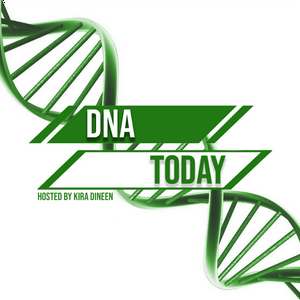As Rare Disease Month comes to a close and Rare Disease Day approaches, we are turning our focus beyond the United States to explore what rare disease care looks like in Brazil, and how genomics is reshaping the diagnostic journey.
In this episode, we take a deep dive into the rare disease landscape in Brazil, including how patients access genetic testing within a public healthcare system, the barriers families face compared to those in the U.S., and how whole genome sequencing (WGS) is accelerating diagnoses that once took years or even decades.
Joining us is Dr. João Bosco de Oliveira Filho, a physician-scientist who helped lead Brazil’s national rare disease genomics initiative, Genomas Raros, and now continues this work through his laboratory, NeoGenomica. We’re also joined by Victor Camillo from MGI, who shares a global technology perspective on how large-scale sequencing efforts can expand access to rare disease diagnostics, especially in middle-income countries.
Together, we discuss:
How rare disease care in Brazil compares to the U.S.
Why whole genome sequencing is a game changer for undiagnosed patients
Lessons learned from national-scale genomics initiatives
The role of public–private partnerships in sustaining innovation
What the future holds for rare disease diagnostics worldwide
Relevant Resources:
MGI Tech
MGI’s Sequencing Platforms
NeoGenomica
NeoGenomica implements the world's most powerful genetic test, focusing on accuracy and speed in diagnoses.
100,000 Genomes Project by Genomics England
Coelho, A. V. C., Mascaro-Cordeiro, B., Lucon, D. R., Nóbrega, M. S., de Souza Reis, R., Bertollo de Alexandre, R., Moura, L. M. S., Oliveira, G. S., Guedes, R. L. M., Caraciolo, M. P., Zurro, N. B., Cervato, M. C., & Oliveira, J. B. (2022). The Brazilian Rare Genomes Project: Validation of Whole Genome Sequencing for Rare Diseases Diagnosis. Frontiers in Molecular Biosciences, 9, Article 821582. https://doi.org/10.3389/fmolb.2022.821582
Wojcik MH, Lemire G, Berger E, Zaki MS, Wissmann M, Win W, White SM, Weisburd B, Wieczorek D, Waddell LB, Verboon JM, VanNoy GE, Töpf A, Tan TY, Syrbe S, Strehlow V, Straub V, Stenton SL, Snow H, Singer-Berk M, Silver J, Shril S, Seaby EG, Schneider R, Sankaran VG, Sanchis-Juan A, Russell KA, Reinson K, Ravenscroft G, Radtke M, Popp D, Polster T, Platzer K, Pierce EA, Place EM, Pajusalu S, Pais L, Õunap K, Osei-Owusu I, Opperman H, Okur V, Oja KT, O'Leary M, O'Heir E, Morel CF, Merkenschlager A, Marchant RG, Mangilog BE, Madden JA, MacArthur D, Lovgren A, Lerner-Ellis JP, Lin J, Laing N, Hildebrandt F, Hentschel J, Groopman E, Goodrich J, Gleeson JG, Ghaoui R, Genetti CA, Gburek-Augustat J, Gazda HT, Ganesh VS, Ganapathi M, Gallacher L, Fu JM, Evangelista E, England E, Donkervoort S, DiTroia S, Cooper ST, Chung WK, Christodoulou J, Chao KR, Cato LD, Bujakowska KM, Bryen SJ, Brand H, Bönnemann CG, Beggs AH, Baxter SM, Bartolomaeus T, Agrawal PB, Talkowski M, Austin-Tse C, Abou Jamra R, Rehm HL, O'Donnell-Luria A. Genome Sequencing for Diagnosing Rare Diseases. N Engl J Med. 2024 Jun 6;390(21):1985-1997. doi: 10.1056/NEJMoa2314761. PMID: 38838312; PMCID: PMC11350637.
Relevant DNA Today Podcast Episode:
#285 AI To Enhance Variant Curation with Daniel Uribe
#355 How Genomics Is Transforming Rare Disease Diagnosis in Turkey with MGI Tech
#364 Breast Cancer Genetic Testing in Italy: A Curated Gene Panel with MGI
#379 Global Cancer Diagnostics: Building High-Quality Cancer Genomic Testing with MGI
Connect With Us:
Luckily you don’t have to wait long for a brand-new episode of DNA Today, we drop episodes every Friday! Until then, why not dive into our library of over 380 episodes? Binge them all on Apple Podcasts, Spotify, our website, or wherever you love to listen, just search “DNA Today.”
Prefer watching? We’ve got you covered! For the past four years, we’ve been recording episodes with video, including some filmed at the iconic NBC Universal Stamford Studios. Check them out on our YouTube channel!
DNA Today is hosted and produced by Kira Dineen, MS, LCGC, CG(ASCP)CM . Our Social Media Lead Liv Davidson. And our logo Graphic Designer is Ashlyn Enokian, MS, CGC.
See what else we are up to on Instagram, X (Twitter), BluSky, Threads, LinkedIn, Facebook, YouTube and our website, DNAToday.com. Questions/inquiries can be sent to
[email protected].


